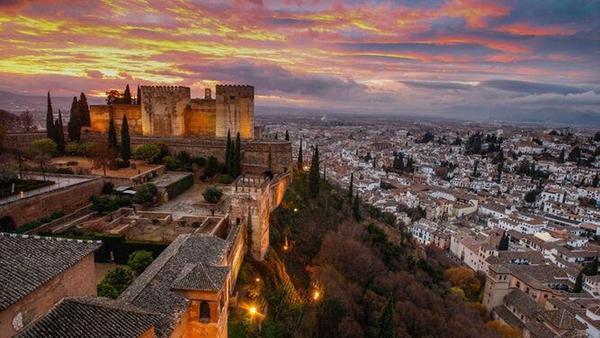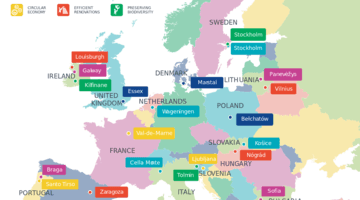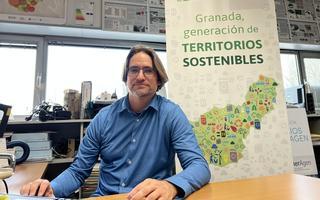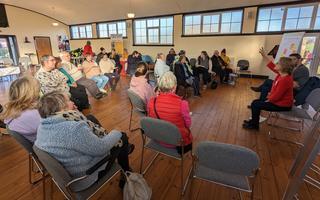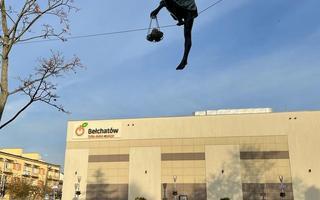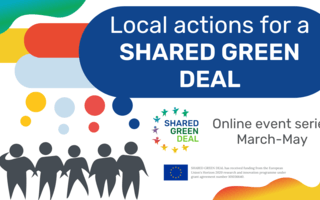Granada: community visions for community energy
Summary of the local experiment
This experiment will bring residents of Granada together to imagine clean energy futures, particularly to address the city’s and province’s high levels of air pollution and high risks of climate change, and to learn how to tackle this through the promotion of citizen energy communities. Participants from the municipality, local businesses, and all social groups will have the opportunity to envision the ways they can address these problems through changes in energy production and consumption, learning what role they can play and how they can advocate for their community’s needs and values.
Local context
Granada is a province in southern Spain, composed of a metropolitan area including the city of Granada and 34 surrounding municipalities, and a rural area with 174 municipalities. It includes varied landscapes, including plains, hills, river valleys, and coast, all of which have a dry, arid climate with little wind. The city of Granada itself, the centre of the region, is located between two hills in the Darro River Valley and is known for its cultural heritage. Agriculture and tourism are key industries in the region. Granada has both a declining and ageing population, as well as a substantial student population due to its university. Air pollution is one of the most substantial environmental challenges in the city and metropolitan area, whereas the forecasted impacts of climate change are a significant problem for the whole province. The city of Granada launched its first Air Quality Improvement Plan in 2017 and has been working to improve sustainability. This has included better planning and data collection, increased green spaces, improvements to energy efficiency, and, recently, energy communities. The Granada County Council also launched a Climate Change Adaptation Plan (Granada ADAPTA) in 2019 to better assess impacts and possible solutions.
Specific needs and challenges
One of the region’s main challenges is air pollution: the city of Granada is generally considered one of the most polluted in the country. Road traffic, heating and construction generate air pollution (particularly carbon dioxide (CO2), nitrogen dioxide (NO2) and particulate matter), and the area’s location between two hills and dry climate exacerbate this, trapping pollution in the valley. Residents of Granada are becoming increasingly aware of the serious health impacts of pollution and are looking for alternative solutions. Energy poverty is also an issue in the more rural areas of the province.
In addition, at the provincial level, droughts, heavy rains, heat waves and other climate hazards are becoming more and more frequent, and to tackle this they have to work in parallel on climate change mitigation and adaptation. Granada County Council has been working for a fair energy transition across the province since 2001, and the promotion of energy communities is currently a priority. Yet much more can be done to establish public participation as a common practice, raise awareness about the problems and find solutions, particularly those which residents can take ownership of.
Detailed description of the experiment
The goals of their community visioning workshop are that:
- Participants feel empowered and are confident that their actions and behaviour as individuals can change the future. They are mindful and respectful of the diversity of opinions of other participants.
- Participants increase their knowledge in the field of clean energy.
- Participants build a community and believe they are not alone and can do something together.
- Participants recognise the different options they have for consuming energy, which don’t just include electricity but also other options like photovoltaics, wind, etc.
The social experiment will consist of 1-2 workshops with local policy makers, 1 workshop with local small and medium-sized enterprises, and 1 workshop with residents (especially younger and older generations when possible). In these workshops, they will work together with participants to co-create community visions for Granada’s clean energy future.
To help facilitate participation in the community visioning workshops, they will partner with a locally-based company specialising in citizen participation. They will implement innovative methods that help participants connect, feel part of the solution, generate new understandings about the needs of different groups, and promote citizen leadership as a driving force for change in the energy sector.
They hope that the experiment will also lead to transparent processes where the reason for decisions taken are known and will promote citizens associations and energy communities among the population.
Local engagement
The experiment will recruit local policy-makers, small and medium-sized enterprises, and citizens (from all social groups, but especially students and older generations).
In the category of policy-makers, they will focus on elected representatives, decision makers and civil servants from the municipalities in Granada, who draft municipal regulations for energy transition and are well aware of energy consumption, demand and efficiency issues.
In the category of businesses, they will focus on local small and medium-sized enterprises which they have contact with.
To engage citizens, they will build upon their work in other projects and engage students, older generations, and other diverse social groups through their work to promote local citizen energy communities. In particular, citizen participation is important for younger people because it will give them access to the political process and generate trust, building political culture and supporting active democracy. They will recruit participants through tailored methods, including direct invitations and online and in-person publicity.
Partners
The partners will work with other offices in Granada County Council, such as the Gender Equality Department and Social Services Department, as well as a local organisation that specialises in citizen participation and integration that is already helping them promote energy communities throughout the province.
Local partner
Diputación de Granada (Granada County Council)
Country
Spain
Number of inhabitants
921,338
City
Granada
Website/social media
Contact
Gonzalo Esteban López, Sustainable Energy Technician, gestebanlopez [at] dipgra [dot] es
Manuel Ibáñez Vázquez, Sustainable Energy Technician mibanez_vazquez [at] dipgra [dot] es
May-Sep 2023
Recruitment of workshop participants, detailed workshop planning and preparation
Oct 2023
Holding 3-4 individual workshops with local policy-makers, businesses, and residents
Nov 2023
1 joint workshop with local policy-makers, businesses, and residents together
Dec 2023-Jan 2024
Synthesizing findings from workshops, sharing the results with participants and other interest groups
Feb-Mar 2024
Dissemination of material in communication channels, press, in other projects
Related Green Deal Priorities
TIMELINE
Case Study Guides
|
Find out more


CONTACT
For further details please contact co-leads Professor Chris Foulds (chris.foulds@aru.ac.uk) and Professor Rosie Robison (rosie.robison@aru.ac.uk).

This project has received funding from the European Union’s Horizon 2020 research and innovation program under grant agreement No 101036640. The sole responsibility for the content of this website lies with the SHARED GREEN DEAL HAS project and does not necessarily reflect the opinion of the European Union.
